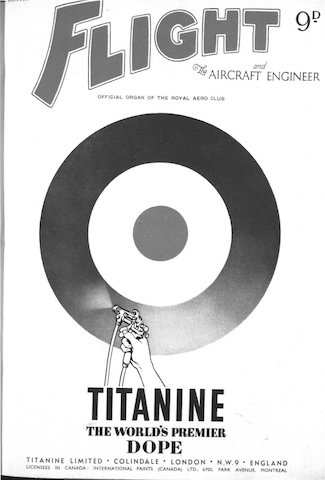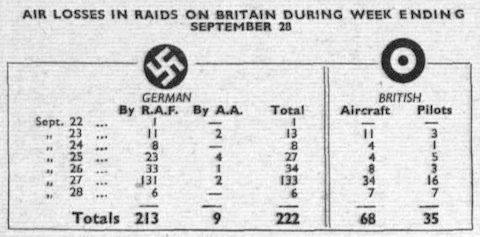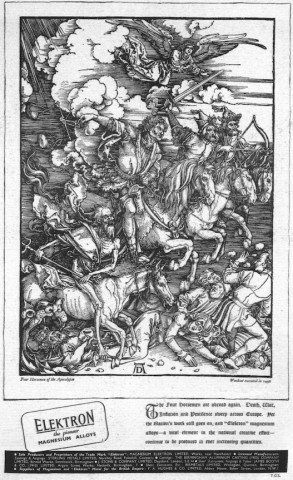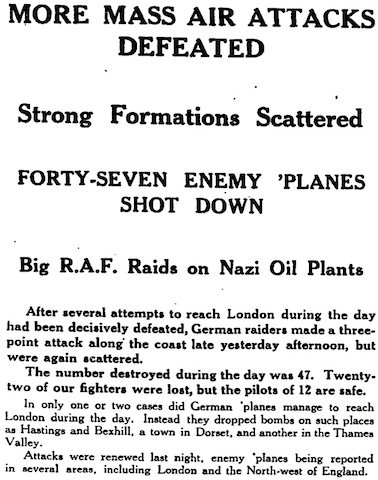
Let's look at how the British aviation press is covering the air war, by way of today's issue of Flight, its longest-running periodical (and official organ of the Royal Aero Club). The front cover, along with the first and the last few pages, carry advertisements for various aviation-related products. Here Titanine Ltd is promoting 'the world's premier dope', cleverly incorporating an appropriate and patriotic symbol in the form of an RAF roundel.
I'll come back to some of the ads later, but now let's turn to the editorial pages. The leading article is devoted to the question of reprisals; Flight is firmly against them (264). The reasons given are not moral but practical:
If the R.A.F. were to pass by factories which make munitions of war and divert their energies to killing German civilians, one can picture the sardonic grin of satisfaction which would steal over the face of the Führer. Munitions are valuable to him; the lives of Germans are not.
Moreover, there's no chance as yet that 'the sufferings of the Berliners might drive them to rising against the Nazi Government':
The German armies have conquered much of Europe and are still undefeated. While that is the position, it is preposterous to imagine that the clamour of a city population could force the Government to turn from its course.
And if civilians did protest in any way, the Gestapo would probably just throw the 'loudest-voiced malcontents' into an 'internment camp'.
As you might expect, Flight has extensive coverage of the 'War in the air', as the regular section is called: it runs to four pages this issue. In tone and content, however, it's not too different from the stuff you'd find in one of the dailies: there's just more of it. The focus is mostly on 'the Fighter Command', with the wins and losses for the week summarised in this neat little table on page 268 (which also tells us that this issue was put to bed as long ago as 28 September):

Bomber Command's activities get about half a page and the rest on the Mediterranean theatre and the Sunderland discovery of the last City of Benares survivors. (A RAAF Sunderland of 10 Squadron, incidentally.)
Another regular feature is Norman Macmillan's article on 'air strategy' (272). Macmillan has had an interesting life: he won the Military Cross and the Air Force Cross in the last war, and after it was a test pilot for Fairey and then head of the National League of Airmen. But I wonder if he's in danger of becoming a bit of a bore. This is his twenty-second article on air strategy; no less than twelve of them have been on his pet idea of the 'air blockade' of Germany and Italy, the enforcement of which in his view is the best use of the RAF. Not that the idea is uninteresting in itself, but Macmillan clearly didn't learn much from Rothermere, his journalistic mentor, on how to keep readers interested. But it's fine in small doses. Macmillan argues that there can be no compromise peace -- France's subjugated state shows that this would mean that 'the fate of every man, woman of child of British birth would rest in the hands of Hitler and his conspecific Italo-Germans'. And the air is the only place where Britain has been able to take to the offensive. This is despite the fact that, due to the government's lack of foresight, the RAF entered the war 'with insufficient aircraft'. Even now,
It seems that some of our present leaders hold the view that aircraft are still only the means to an end, that end being the ultimate victory of sea and land forces over the sea and land forces of the enemy. That view is out of date.
This is unfortunate, because:
The Royal Air Force has had to be taken from its function of maintaining the air blockade of Germany and Italy to conduct a war against the sea and land forces of Germany which have been concentrated along the western seaboard of the continent of Europe [...] Night after night and frequently by day the bombers of the R.A.F. have been directed against objectives which are directly naval and military in character.
And what does Macmillan mean by 'air blockade'? Like a naval blockade, it's aimed at a long-term strangulation of the enemy economy. To this end he wants the RAF to make sure to bomb industrial targets in remote eastern Germany (what he calls Zone 4), such as:
Armaments at Freital and Pirna; metal industries at Gleiwitz, Lauchhammer, Ulm, Laband, Paruschowitz, Munich, Chemnitz and elsewhere; at Dresden the following articles are made: typewriters, chemicals, sirens for air raid and fire alarms, rollers, hoppers, compressors, ladders, buildings, watches, nautical, survey and aircraft instruments, telephones and cables, high-pressure nozzle apparatus for fire-fighting. At Breslau rolling stock and road coaches, non-ferrous metals, chemicals, charcoal, machining, bridge-building, bandages and drugs, telephones and cables, saddlery and linen. These are only an indication of the industry which exists in Zone 4. It contains a great cloth-producing belt. Motor vehicles, aeroplane engines, air-frames, optical instruments are made in Zone 4. In fact, it contains all the elements needed to provide a safety zone for German industry until the R.A.F. really go for it.
So rather than a lazy recourse to morale bombing, or a bloody dependence on a ground invasion, prolonged, precision bombing of German industry is the way to victory.
There's one thing an aviation magazine must have, and that's aircraft. Today's issue has a couple of aircraft features. The first is a report on the 'Leviathan bomber' now nearing completion in California, the Douglas B-19. 'Democracy's sword and armour' has a wingspan of 210 feet, a gross loaded weight of 140,000 lbs, and a rather incredible bombload of 18 tons. No range is given 'but wild statements such as from Los Angeles to Europe and back are not lacking'. On the following page, the suggestion is made that
The whole thing seems to be a gigantic experiment in evolving an ocean-crossing bomber, a type which U.S.A. must have unless her defence is going to be based entirely on making contact with an enemy who has arrived at the national boundary or comparatively close to it.
Then there's a very technical article on a 'Modern German bomber', the Ju 88. While it has 'some features strange to British eyes' and is described as clumsy-looking, on the whole the analysis seems fairly objective.
Finally, a couple of ads. The first one seems somewhat redundant -- surely that this company is hiring is well known by now!
The advertising manager for Magnesium Elektron Limited is either a genius or a miser, as they've employed an artist whose been dead for four centuries and doesn't need to be paid.
The Four Horsemen of the Apocalypse are abroad again. Death, War, Inflation and Pestilence sweep across Europe. Yet the Nation's work still goes on, and "Elektron" magnesium alloys -- a vital element in the national creative effort -- continue to be produced in ever increasing quantities.
And yes, it really does name Inflation as one of the Horsemen!
![]() This work is licensed under a Creative Commons Attribution-NonCommercial-NoDerivatives 4.0 International License.
Permissions beyond the scope of this license may be available at http://airminded.org/copyright/.
This work is licensed under a Creative Commons Attribution-NonCommercial-NoDerivatives 4.0 International License.
Permissions beyond the scope of this license may be available at http://airminded.org/copyright/.









Erik Lund
The filler from Macmillan provided _Flight_ with an enormous amount of filler in the first 18 months or so of the war, until censorship relaxed and it began publishing useful technical articles again. Yes, he is tedious --but it beats three pages of "All work and no play..."
This issue is a double play, though. It also has the generic Titanine/Cellon cover. I don't have any evidence of this, but I'm pretty sure that those are default covers that the paint companies picked up cheap when there was nothing else to go on the front.
And it's too bad that they weren't allow to say anything worthwhile. The B-19 rollout was pretty entertaining in its own sad way.
Brett Holman
Post authorI don't know if my tolerance for Macmillan's articles is higher or lower after having spent a few days going through his archives at the RAF Museum...